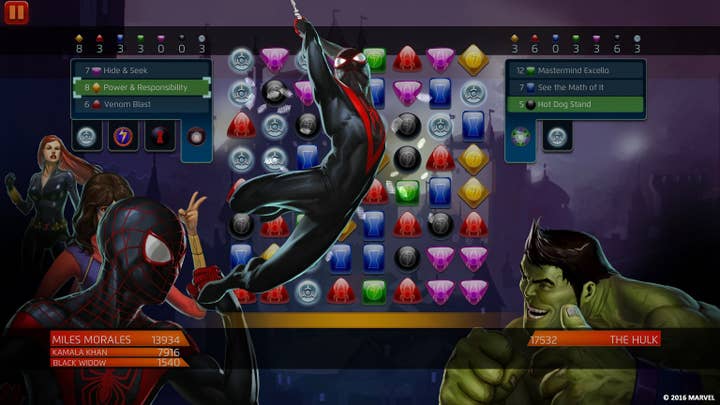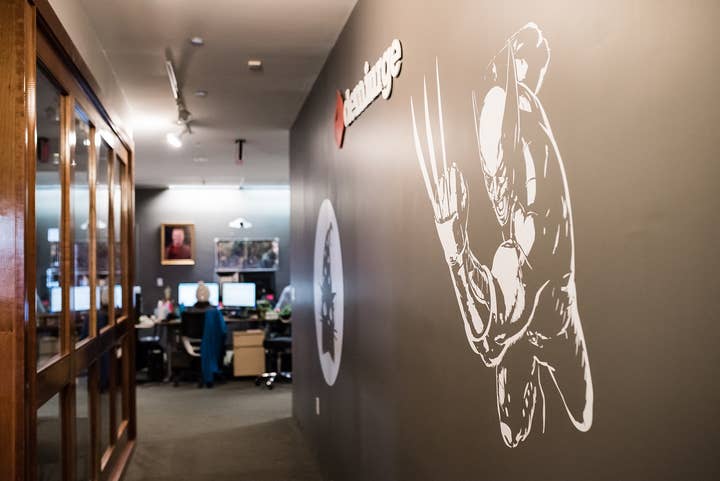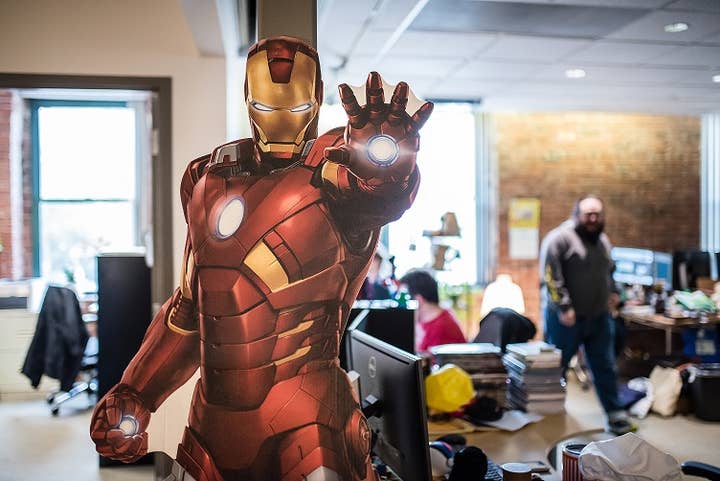Demiurge co-founder buys the studio back from Sega
Original CEO Albert Reed wants the Marvel Puzzle Quest developer to return to supporting work on AAA titles
Demiurge is an independent studio once again.
Speaking with GamesIndustry.biz to reveal the news, Demiurge co-founder and chairman Albert Reed said he and longtime business partner Geoffrey Hyatt have bought the Marvel Puzzle Quest developer back from Sega, which acquired it in 2015.
"When Sega was looking to make a strategic change and were interested in doing something different, they gave us a call," Reed says. "One thing led to another and now here we are."
As a result of the acquisition, Demiurge general manager Bart Simon has become the CEO of the newly independent studio.
Although Reed originally left Demiurge in 2017, he says it's very much the same as when he left it, which isn't that different from before its acquisition by Sega. Sega gave the company plenty of independence he says, even allowing it to continue its work with D3Publisher to run and maintain Marvel Puzzle Quest.

"It is very much the same company it was when it was acquired," Reed says. "About the same size. The vast majority of the staff is actually the same... A lot of it is actually pretty similar. When we were discussing things with Sega, it was an easy conversation because myself and my business partner already kind of knew everything."
And just as it still runs Marvel Puzzle Quest, Demiurge will continue to operate the match-three mobile game Sega Heroes after regaining its independence.
"We see [support studios] rise at the start of new console generations because there's a bunch of new hard problems"
However, not everything is staying the same. While Demiurge became a free-to-play mobile specialist over the last decade, it has been around for 18 years now and Reed says he also wants to get back to the studio's roots. That doesn't just mean independence; it means a return to life as a support studio partnering with AAA developers.
Before being picked up by Sega, Demiurge worked with Gearbox on Borderlands and Brothers-in-Arms. It worked with EA on Mass Effect and Medal of Honor: Airborne, Irrational Games on BioShock, and THQ on Titan Quest and Frontlines: Fuel of War. Sometimes it made multiplayer maps or art assets. Other times it worked on optimization and performance issues.
Reed wants to do that again, and he thinks it's a great time to be a studio in the business of helping other studios finish games.
"We see those businesses rise at the start of new console generations because there's a bunch of new hard problems and everyone is sort of pressed and pouring more money into research and development," he says. "We see it when business models evolve, which I think is happening right now in console and PC with games-as-a-service."
"Every game in development on the planet is now a month behind. So we're excited to find partners that need a little extra muscle to get their games over the finish line"
And while it certainly wasn't part of the plan or anything to celebrate, Reed acknowledges that a studio like Demiurge may be in greater demand because of disruption from the ongoing novel coronavirus pandemic, which has caused various temporary studio shut downs and worldwide pivots to working from home.
"That means that every game in development on the planet is now a month behind," he says. "So we're excited to find partners that need a little extra muscle to get their games over the finish line."
Sony and Microsoft have both emphasized the developer-friendliness of their upcoming consoles, so we ask if there might not be quite as much call for assistance as there was in previous new console generations, but Reed isn't terribly concerned.
"From a technology standpoint, as much as the console makers are trying to make it easy for developers, new hardware means new challenges," he says. "It means supporting different platforms with different performance characteristics, and you want to very thoroughly satisfy players on both of those. And that means more raw effort -- more person power needs to be put into the games -- and also there are new technologies and techniques to learn and apply.

"I still think the biggest shift there is that increasingly -- this is a trend that's happened for several years now but is only accelerating -- developers are having to learn what it means to launch a console [game] and run it for four or five years, what the implications are at the beginning of the design of the game, what it means for the team as you move from the launch to the operational phase of the title. And yeah, suddenly now you're supporting more platforms than you were supporting before, and that has a bunch of implications."
Reed says he's particularly excited about the potential of cross-play between platforms and the convergence of mobile and console or PC games in terms of being run as live services.
"If you look across platforms... most of what's happening is evolutionary. It's borrowing from other businesses and platforms, and applying them to new places"
"We're finding those ways of running [mobile] games porting back into console and PC," Reed says. "And because there are not a lot of studios that have built AAA console content and mobile free-to-play content, we're really in a unique position to help console PC developers to navigate what it means to run a game as a service, do real live operations, roll out new content, and continually tune and balance a game as it evolves."
As much as the games-as-a-service approach has changed the business -- both for Demiurge and the industry as a whole -- Reed says much of what the studio learned in its nearly two decades of experience remains just as relevant as ever.
"I think there's a little bit of 'Everything that's old is new again,'" Reed says. "We're on the cusp of another console cycle, so there are a bunch of things that if you've been making games long enough, you see happen over and over again. You see business models migrate from console to PC, then PC to mobile, and back to PC again. I think the past several years of games have seen some big shifts. But for the most part, if you look across platforms and take a really wide-angle view, most of what's happening is evolutionary. It's borrowing from other businesses and platforms, and applying them to new places."
Going forward, Demiurge will continue running Marvel Puzzle Quest and Sega Heroes. Reed can't say specifically what other projects the company is working on, but he does say it will be supporting work on other companies' titles and not original Demiurge games.
"That's what we're going to focus on for the next 12 to 18 months." Reed says. "We have a really long history of partnering with the top studios and publishers. Some other indies might look down their noses, but we've found it to be incredibly rewarding work. You get to work with fantastic IPs and learn from the best developers. It's a great business."

